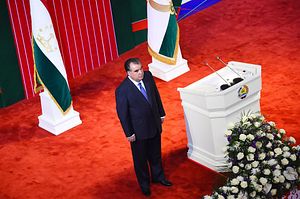“Rogun is not only a source of light, but a national honor and dignity,” Tajik President Emomali Rahmon said in a wintertime national address. Rahmon praised the massive project, lauding it as not only important for the country but as “the arena of labor, bravery and generosity, trials of heroism, and, more so, our national idea.” The very idea of the Rogun dam is more than twice the age of independent Tajikistan.
Tajikistan, the government said, would complete construction by 2012. (The above quotes come from a January 2010 speech).
Four years later, at a similar nationwide address, Rahmon remains bullish about Rogun’s prospects. Recent events, particularly in neighboring Uzbekistan, lend enthusiasm to his proclamation that Tajikistan would become energy independent within three years.
Rahmon said that there are 11 energy projects worth $1.2 billion in progress in Tajikistan, including the $140 million reconstruction of the Sarband hydropower plant and updates to the critical Nurek dam, worth more than $380 million.
Construction began (again) at the Rogun site in November, forty years after the first time construction commenced. I wrote at the time:
Given the project’s history, skepticism is warranted. All the spoilers that derailed previous pushes to finish the dam remain possibilities; political instability and financial failings could easily balloon costs or delay construction further.
On the financial front, Dushanbe’s opacity doesn’t help in assessing whether the country has the financial wherewithal to pull off the projects needed to become energy independent. A massive chunk of the money directed towards these projects comes in the form of aid. For example, the Sarband rehabilitation, Asia Plus reported, is supported by a 2013 grant from the Asian Development Bank (ADB) to the tune of $136 million. At the time Asia Plus reported that Tajikistan was to supply $34 million in counterpart funding.
Tajikistan, meanwhile, has proven to be incompetent in tackling corruption or, to date, fixing its banking sector. Dushanbe spent much of 2016 courting the International Monetary Fund for a bailout, estimated at $500 million. Meanwhile — with money from who knows where — Dushanbe seems to have bailed out the county’s major banks with the issuance of debt securities. Also for consideration is the unusually public spat in October between the Finance Ministry and the notorious TALCO plant, which took place against a backdrop of talk that Dushanbe would roll back electricity subsidies.
One other area to watch closely is Tajik-Uzbek relations. Uzbek President Shavkat Mirziyoyev seems to be making an attempt at pumping new life into cross-border relations. The agreed resumption in January — after a 24-year pause — of direct flights between Tashkent and Dushanbe is an illustration of this. An Uzbek delegation, led by Deputy Prime Minister Rustam Azimov (who recently lost his other job as finance minister), is scheduled to touch down in Dushanbe on December 26 (one has to wonder if they’ll get a special, early direct flight.). While talks are expected to center on roads and rails, it’s hard to imagine the topic of Rogun will go unmentioned.
A March 2010 BBC article about the Rogun dam — and Tajikistan’s energy optimism — references an open letter sent to the Tajik government in February 2010. The letter demanded that international experts be allowed to study seismic activity in the dam’s area and the potential environmental impact. (That wish was granted in 2012 by the World Bank.)
“The Rogun hydropower plant project was developed almost 40 years ago, it’s an outdated project,” the letter said. “[I]t is hard to conceive the scale of the humanitarian disaster were the dam to be breached.”
The letter was signed by Uzbekistan’s then-prime minister, Shavkat Mirziyoyev.
To be fair, all dams — by definition — have significant impacts on water flow and therefore on downstream countries. These impacts are best moderated through diplomacy, which until recently was miserably absent between Tajikistan and Uzbekistan.

































